The UK Hospitality Sector: COVID Impact and Recovery Insights
In August this year, it was reported that over three quarters of UK hospitality businesses were at risk of insolvency.
For an industry that employed over three million people prior to the COVID-19 pandemic, that’s about as grim as it gets.
Calls for a VAT cut and extension to the business rates holiday have continued long into the night as the sector’s leaders, experts and ground staff do everything they can to introduce some hope.
But where are we with COVID and hospitality, exactly? More importantly, what can we expect from the future?
There are few industries as resilient, passionate and determined as this one. Let’s see how it’s reallyfighting the pandemic.
Putting it into context
Let’s consider just how much of a beast the hospitality is.
- Contains 20,000 small businesses
- Contributes £120 billion to the UK economy each year
- Employs 3.2 million people
- The event industry alone contributes £42 billion to the economy
- The estimated hotel room supply in the UK is 840,000
These huge numbers reveal just how much is at stake with COVID. So, what impact has there been so far? Let’s look at the two biggest players in the sector: hotels and restaurants.
The impact so far on hotels
There are three metrics which matter particularly to hotels. Thanks to research by Avvio, we can see the impact of COVID-19 on bookings, average booking values and the ADR (average daily rate) between February and June this year, compared to 2019.
Bookings
The falloff in bookings following the national lockdown in March is as stark as it is expected.

Average booking valueAverage booking values during the pandemic actually paint a rather rosy picture. In some instances, they soar high above their 2019 equivalent.
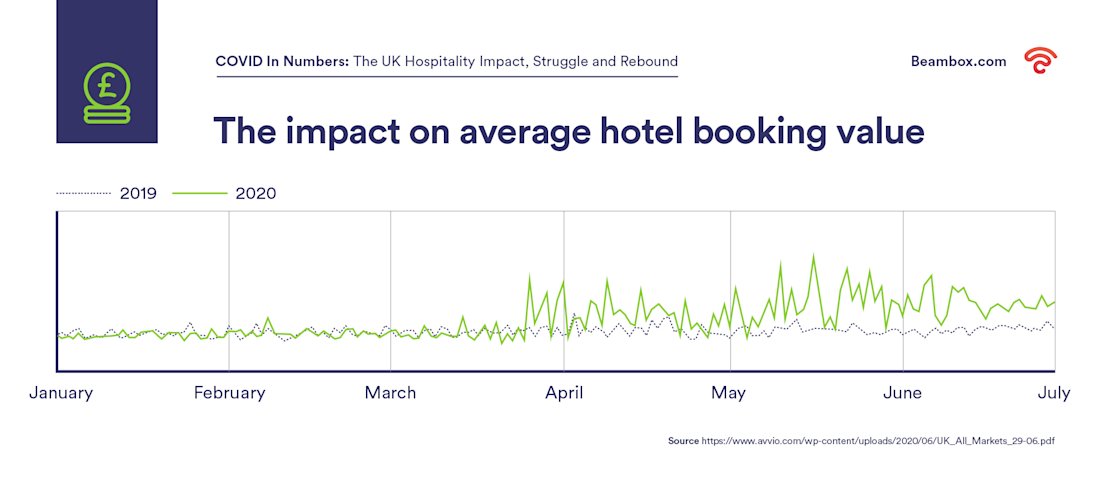
Average daily rate
The average daily rate for hotels has remained resolute during this period, although some of the dramatic peaks potentially reveal panic pricing and revenue management gone haywire-understandably.

If we turn our attention to the London hotel market, the immediate impact of the lockdown period is evident. The drops in occupancy and ADR aren’t exactly surprising, but they’ll clearly be upper most in the government’s minds during discussions about future lockdowns.London hotels: occupancy
London hotels
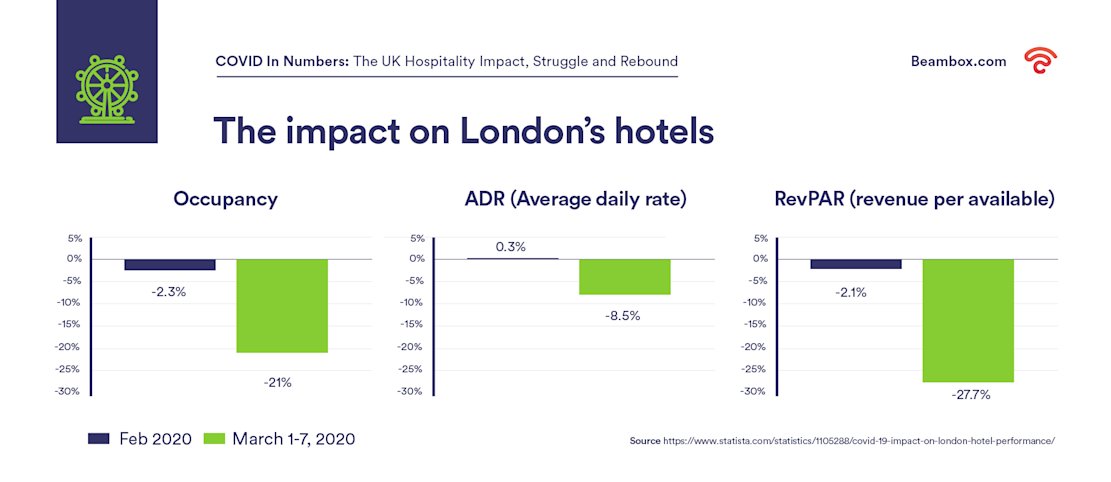
Need a boost as a hotelier? Read this: How to Gain More Direct Bookings at Your Hotel or Rental Business
The impact so far on restaurants
From hastily implemented delivery services to inventive social distancing tactics, restaurants have had a year like no other.
Just like hotels, this part of the sector has effectively been halted by COVID-19. But what do the numbers tell us?
Here’s what the like-for-like sales in the restaurant industry look like before and after the COVID-19 warning this year.
All outlets
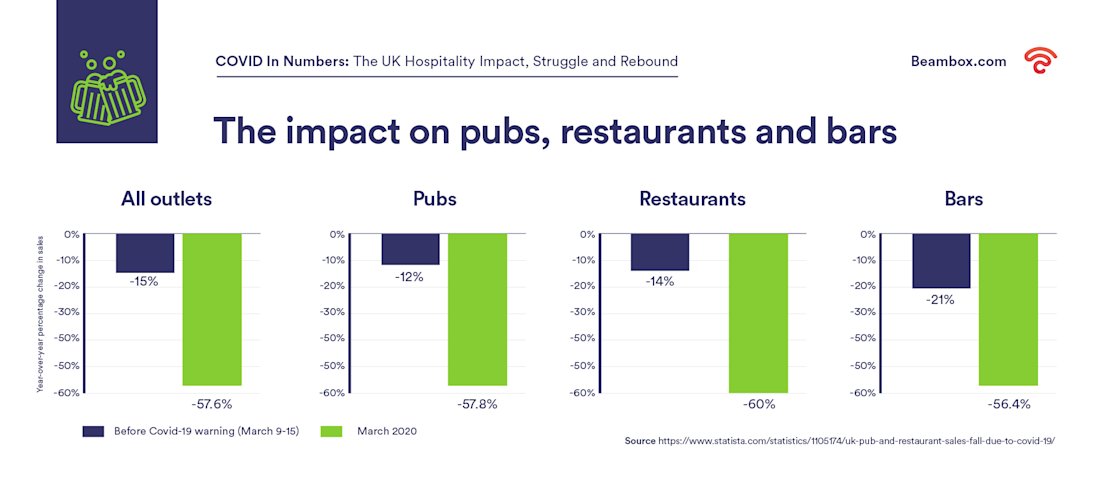
Recent research has revealed even deeper insight into the impact of COVID-19 on restaurants. And it isn’t all doom and gloom -thanks in no small part to the Eat Out to Help Out scheme.
Average hours worked - 2020 vs 2019
Despite the furlough scheme and a number of other stimulus packages introduced by the government, restaurants have clearly struggled to keep their teams running at full capacity -more so than any other industry.
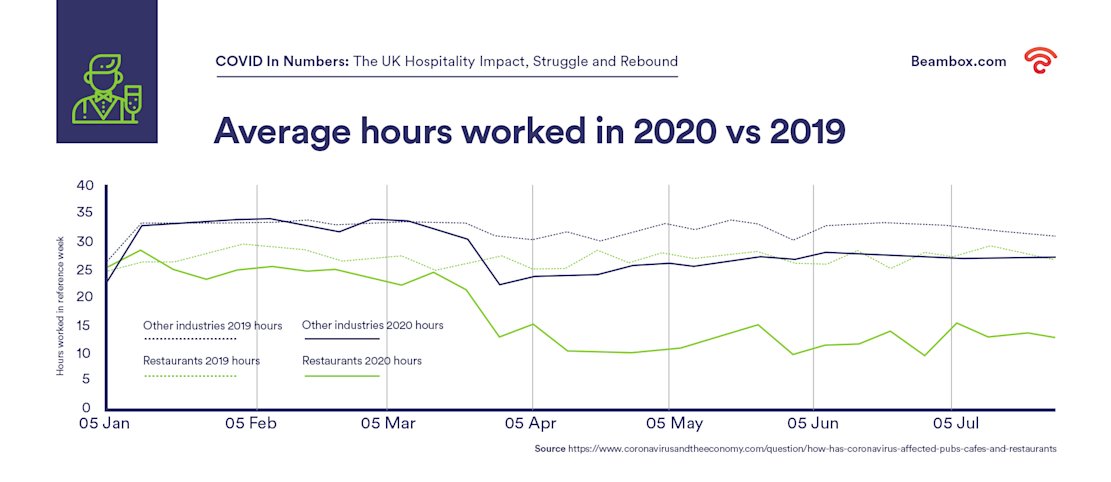
Dining numbers - 2020 vs 2019
As you’d expect the number of people dining throughout the week has remained well below 2019 figures, although there was a significant spike during August thanks to the Eat Out to Help Out scheme.
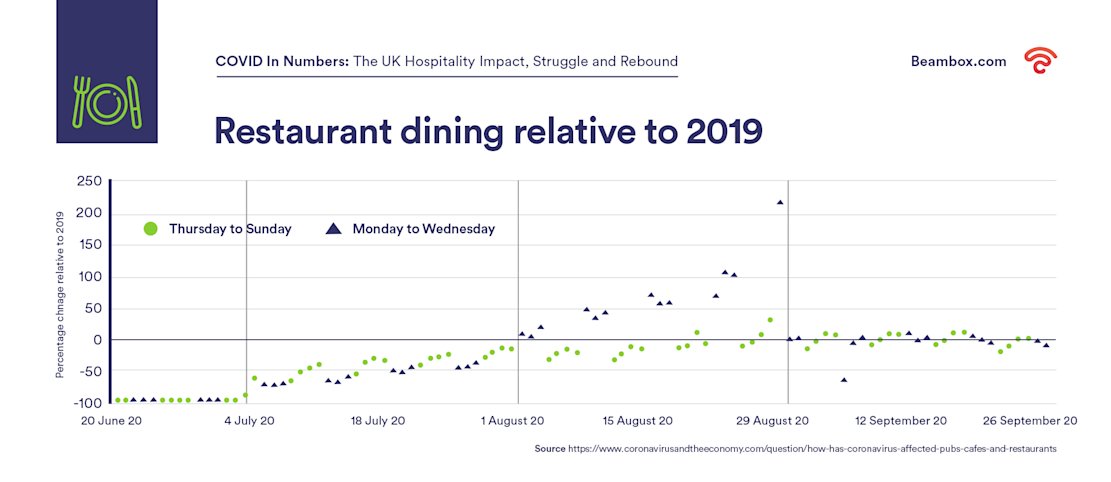
Need a boost as a restaurateur? Read this: 10 Ways to Incentivise Your Restaurant Team - Today
The rebound
So, what does the future hold for hospitality in a post-COVID world?In truth, it’s very hard to predict, but we do know one thing: this industry is incredibly adept at bouncing back from hard times.Take the ‘Great Recession’ which resulted from the global financial meltdown during 2007 and 2009. In the wake of the ensuing credit crunch, the hospitality sector managed to increase the number of restaurants by 16%, steadily increase sales and raise the number of people working in the industry by two million.
COVID-19 will cause a significant recession - everyone seems to be in agreement about that, but history tells us that recessions can actually be a goodthing for restaurants. Following past recessions, the hospitality industry has excelled with:
- recruitment, thanks to fresh job seekers on the market;
- new, exciting locations thanks to once unattainable properties becoming affordable; and
- innovation.
The last point above is perhaps the most important -and the most exciting. Hospitality is one of the most innovative markets in the world, and it seems to have a limitless imagination in the face of adversity.
The future is tough -no one is saying otherwise. But if there’s one industry that can bounce back from the struggle and significant challenges introduced by the coronavirus, it’s hospitality.
Related read: How the Restaurant Industry Always Bounces Back From a Recession
Useful resources
We’ve spent the last few months putting together some tools which we think you’ll find incredibly useful at the moment. And they’re all free!
- How to Identify Needless Costs in Your Hospitality Business
- 10 Vital Tasks for Restaurateurs During the COVID-19 Downtime
- How to Create an Online Food Delivery Service From Scratch
- Free Staff Scheduling Spreadsheet for Restaurants, Bars and Hotels
Get Started With Free WiFi Marketing
Beambox helps businesses like yours grow with data capture, marketing automation and reputation management.
Sign up for 30 days free

